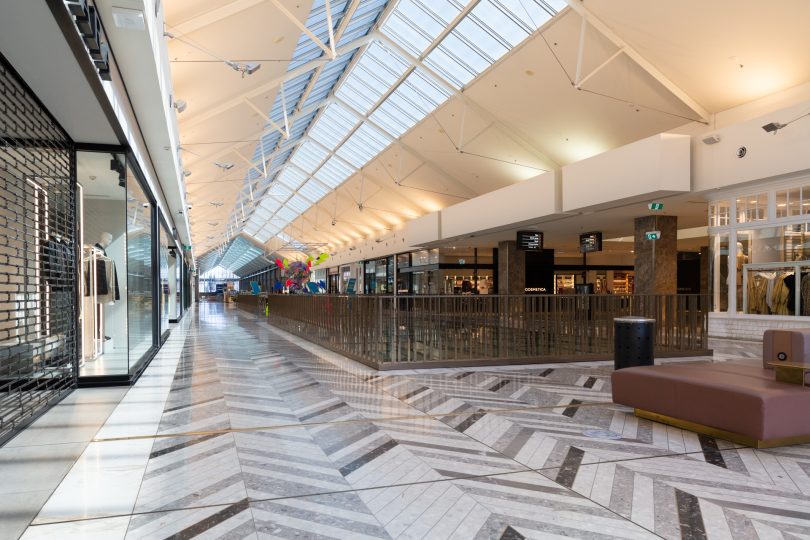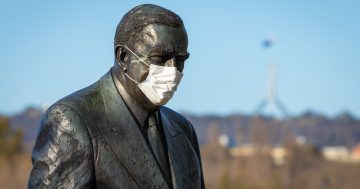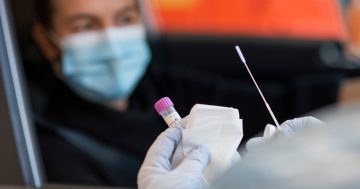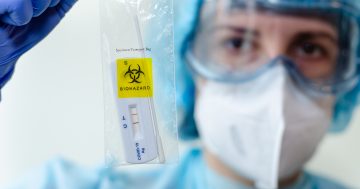
Canberra Centre during lockdown: The Chief Minister says reducing restrictions at a 70 per cent vaccination rate won’t be safe. Photo: Thomas Lucraft.
UPDATED 2:30 pm: Chief Minister Andrew Barr and the ACT Cabinet are considering ongoing public health measures in a meeting likely to go on well into the evening as Chief Health Officer Dr Kerryn Coleman briefs them about the current status of the COVID-19 outbreak.
Announcements are likely tomorrow, and Mr Barr said at today’s press briefing that the pandemic’s effects in other jurisdictions would also influence the decisions made for the ACT.
There’s evidence that when COVID-19 enters a household, it will affect most residents and workplaces and a cumulative level of risk around any place where people come and go at relatively high volume, Mr Barr said.
“The balancing act this week and beyond is how we minimise the transmission potential through our public health measures in high-risk settings,” he said.
The Chief Minister has also challenged assumptions that opening up restrictions at a 70 per cent vaccination rate under the national plan would be safe.
“Treasury will make all the muscular assertions about what the Commonwealth will or won’t do,” he said, but the national plan requires all jurisdictions to be on board before proceeding with the next steps. Mr Barr said there had been vigorous discussion around this at National Cabinet.
“Even the Prime Minister is now changing his language and tone that 70 per cent is not the magic number; it’s a gentle step forward”, Mr Barr said.
“The commentary from people who have not read the national plan is incredibly unhelpful.”
The intention remains that the ACT will reach 70 per cent and then 80 per cent vaccination targets well ahead of the rest of the nation. Mr Barr said he believed an 80 per cent vaccination rate was a much safer point to consider significant easing, particularly since testing, tracing, isolating and quarantining is likely to be much less effective if there are thousands of cases.
“Let’s stop talking about 70 per cent. It’s not safe; 80 per cent is the more realistic step forward.
“My hope is that by the time the nation reaches 80 per cent [vaccinations], the ACT will be 90, hopefully even 95 per cent. With that level, you get as close to herd immunity as you’ll ever get. That makes things a lot safer.”
Mr Barr said that the NSW Government would advise the ACT of any change in their settings and that the two jurisdictions have agreed on establishing as much consistency as possible between them.
The ACT had also flagged consideration of differential settings for parts of regional NSW.
“I understand that from the NSW perspective … but we’re exploring whether there can be settings for the broader Canberra region,” he said.
“None of this is easy. Inevitably you end up drawing lines where someone will fall on the other side.”
Mr Barr said much would also depend on the virus status around NSW, including the recent detection of COVID-19 fragments in sewage at Cooma and what he described as “the infamous Merimbula incident”.
Health Minister Rachel Stephen-Smith said that while everyone seeking to enter the ACT must have a valid exemption, ACT Police were exercising judgement on individual cases. She denied that people with valid exemptions were being turned around at the border.
12:30 pm: The ACT has recorded 12 new COVID-19 cases, six of which are linked to current cases and sites. However, there’s concern that people continue to be in the community rather than in quarantine for their entire infectious period.
At today’s press briefing, ACT Chief Minister Andrew Barr said that four cases remain under investigation, including two that have no known links. Six cases were in the community at some time during their infectious period, and there are 20 cases whose origin isn’t linked yet.
The outbreak totals 261 cases, of whom 25 have now fully recovered.
Chief Health Officer Dr Kerryn Coleman said that there are now three people in intensive care of the 12 who are hospitalised. All but one of the hospital cases were unvaccinated and the remaining patient had a single dose.
She clarified that some numbers will move around as cases are investigated and stronger links become apparent. Dr Coleman said that household contacts remain a strong source of infection, but sites are also being added to the exposure list that are more than 14 days old. There are currently 191 exposure sites across the geographic spread of the ACT.
“If you have been to one of these sites, please get tested and quarantine until you get a negative result. This process helps us to identify any undiagnosed cases and helps with more information,” she said.
The Bright Bees cluster has now risen to 28 cases and Fiction nightclub stands at 50 as four older cases have now been linked to the cluster.
There continues to be concern about social housing exposure sites, including Ainslie Village.
“What’s happening across the epidemiology of the outbreak is that if the virus gets into high risk and vulnerable settings, it can be a big setback for overall pandemic management of an outbreak,” Dr Coleman said.
Onsite testing and vaccination are taking place at Ainslie Village. Dr Coleman said that there had already been a high rate of first dose vaccinations in the community housing facility, but the situation remained challenging.
Health Minister Rachel Stephen-Smith said that there is pressure on all Australian health systems, including around associated issues like mental health. Canberra Hospital and Calvary Public have allocated COVID-19 facilities and Ms Stephen-Smith said the Garran surge centre could also be used as a specific health facility should it be required
The Chief Minister said that more information about plans for the week would be forthcoming after Chief Health Officer Dr Kerryn Coleman briefs Cabinet this afternoon about public health options.
“Delta is very challenging to contain. As today’s data confirmed, we still have people infectious in the community, cases that don’t have clear epidemiological links. This is concerning,” Mr Barr said.
“It is very clear that we will require ongoing public health measures beyond this week. We don’t want all our hard work over the last few weeks to go to waste by opening too early.”
He continued to defend the decision not to re-open residential construction despite considerable pressure from the sector to do so.
The Housing Industry Association has released a statement criticising the Chief Minister’s assertion that residential construction is less safe than commercial construction but Mr Barr said there is a cumulative risk in the number of workers who are back in workplaces and that even at the beginning of the pandemic, the area of compliance fail was on smaller sites.
UPDATED 11:55 am: The ACT has recorded 12 new COVID-19 cases to 8:00 pm last night.
ACT Chief Minister Andrew Barr said six cases are linked to current sites and an identified close contact; four are under investigation; two have no known links at this stage.
Of the 12, two were in quarantine for their entire infectious period, but six were in the community and four are being investigated.
Twelve people are in hospital with COVID-19 and three are in intensive care.
The ACT reported 2262 people were tested yesterday.
Mr Barr said this total should be higher. He asked that people check the list of exposure sites daily and come forward for testing, as should anyone with even the mildest COVID-19 symptoms.
In NSW, Premier Gladys Berejiklian reported 1290 new cases in the state, as well as four new deaths – a man in his 50s in Dubbo, a woman in her 60s, and two men in their 70s.
10:35 am: COVID-19 testing will be offered today to all staff and residents at the Ainslie Village social housing complex in Campbell after being named an exposure site.
Its Winter Lodge is one of three close contact exposure sites from last Wednesday and Thursday listed today, with the rest of the complex a casual contact site.
The other close contact sites are Ceylon Cut, a hairdresser in Phillip from more than two weeks ago on 12 August, and Bright Bees childcare centre in Nicholls from 16 August.
Casual contact sites also include the Priceline Pharmacy at Westfield Woden, and Officeworks stores in Braddon and Belconnen.
Check the full list for locations and exposure times on the COVID-19 website.
Health Minister Rachel Stephen-Smith has apologised to people held in quarantine longer than they should have been due to technical issues.
She told ABC radio that those connected to the Harrison School, Gold Creek School and Lyneham High outbreaks should have received an email from ACT Health officially releasing them from quarantine.
“We had recognised that while thousands of people had been released from quarantine, there were clearly a number of tech issues with the system meaning that people were not being released,” she said.
A large group of people from these schools had been caught up in this, as well as those from COVID-affected areas of NSW. Ms Stephen-Smith conceded there may still be a small number who had not yet been released, but the blanket release would ensure everyone could end their quarantine as quickly as possible.
But Ms Stephen-Smith warned people that the symptoms from the Delta variant were different from earlier variants and now mimicked a cold or flu, and people with symptoms should not delay getting tested.
Testing times this morning are:
- Drive Through COVID-19 Testing at Exhibition Park in Canberra: less than 10 minutes
- Drive Through COVID-19 Testing Clinic at Brindabella Business Park in the Canberra Airport: less than 10 minutes.
- Drive Through COVID-19 Testing at Kambah: 1 hour
- Weston Creek Walk-in Centre COVID-19 Testing Clinic: less than 10 minutes
- Gold Creek School Pop-up COVID-19 Testing Facility: Minimal
- Erindale Active Leisure Centre Walk-in COVID-19 Testing Centre: Minimal.
The Gold Creek School Pop-up COVID-19 Testing Facility is now open for testing for the general public.















